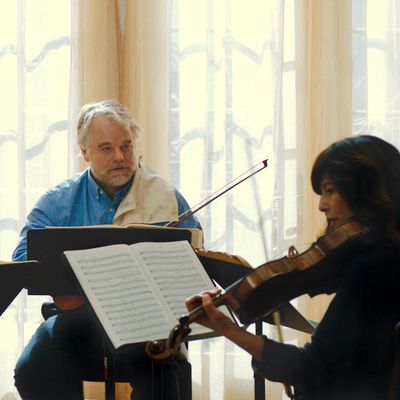
Soap operas featuring musicians are in a different league than all the rest, if only because musicians’ emotions are apt — at least for the purposes of drama — to be right there on the surface. You can see them channeling their heartbreak, their fear, and sometimes even their rage into the music, pouring themselves into the notes while inside all is roiling chaos. When the music is Beethoven, late Beethoven, the late Beethoven quartets — among the most mysterious and inexhaustible pieces of music ever written — and the quartet members are embodied by the likes of Christopher Walken, Catherine Keener, Philip Seymour Hoffman, and the Ukrainian-Israeli actor Mark Ivanir, what the hell’s not to like? Artless filmmaking, predictability, a heavy hand? Piffle, on the scale of things. Overall, it’s a good movie.
The title, A Late Quartet, has two meanings: It refers to both Beethoven’s thrillingly difficult “Opus 131” and the New Yorkbased group that has been together 25 years through more than 3,000 performances and is now on the brink of momentous change. (The group is called, alas, the “Fugue Quartet,” which is too obvious. Why not just the name of a place or composer?) Walken plays the cellist and leader, Peter, who — after a hiatus following the death of his beloved wife — finds himself unable to sustain the notes. It turns out to be early-stage Parkinson’s, and Peter is not the kind of man to cling to the past at the expense of the music.
His announcement to his colleagues creates instant emotional disarray. He has been a surrogate father to Keener’s violist Juliette and she’s devastated by the prospect of his departure. Her husband, Robert (Hoffman), the second violinist, is no more stable. Their marriage was built on a shaky foundation — she’d been in love with Ivanir’s Daniel, the first violinist. It gets ugly when, with change in the air, Robert announces his intention to alternate the first-violinist chair with Daniel and his wife doesn’t have his back. (Meanwhile, Robert has been supplying his running partner, a sultry flamenco dancer played by Liraz Charhi, with CDs of famous quartets — they’re past Bartok and into Shostakovich, so you know it’s potentially serious.) Then there’s the couple’s violinist daughter, Alexandra (Imogen Poots), who’s studying with the fiercely exacting Daniel — and who’s soon to be bowing on his heartstrings.
I learned all kinds of things from A Late Quartet, which is directed and co-written (with Seth Grossman) by Yaron Zilberman. In his master classes, Peter talks about Beethoven’s final quartets and the demands they put on players — particularly “Opus 131,” which has no breaks and no time to re-tune the instruments. (Why, given his Parkinson’s, he doesn’t have the group play something a trifle easier — i.e., any other piece in the history of Western quartet music — is one of those problems you need to look beyond in the name of High Drama.) I learned that the second violinist, though often underappreciated, can pull together the first violinist, violist, and cellist. I enjoyed watching Ivanir’s Daniel driving Poots’s Alexandra nuts by making her start her piece again and again. (“You have to feel the resistance … the color must be dark … You need vibrato from the first note … Read Beethoven’s biography, try to get into his mind.”) Daniel’s loving assembly of his bow — using the finest horse-hair from horses he knows — makes for an oddly fascinating interlude. I learned that a non-string-player like me can be totally fooled by actors who fake it this well.
Walken is wonderful. If you saw him in Pennies From Heaven, you know he’s the screen’s most untapped tap dancer, and as weird as his timing is (his caesuras, in particular), he has the concentration of a classical musician. Walken can look authentically stuporous, then come out of the ether faster and with more deadly accuracy than ought to be possible. (That’s what makes him a hell of a tap dancer, too.) His Peter is sad, courtly, set in his ways without being settled. When he hears from his doctor (Madhur Jaffrey) that he likely has Parkinson’s, he responds with a “Wow!” — only it comes out as “H-wah-ow!” and it made me laugh out loud even though the news was so grim.
Weeping over Peter, anxiously trying to placate a husband she thinks is, well, the best second violinist out there, ferreting out the secrets of her daughter, Keener is simply real — that’s her gift, and it’s never ever a dull one. Hoffman is, of course, a virtuoso of misery and self-hatred, and Ivanir (an actor new to me) draws your eyes from even co-stars this illustrious with his thin-skinned intensity. Imogen Poots has a particularly good scene when Keener buzzes her apartment while she’s in bed with Ivanir’s Daniel, her mother’s colleague and former lover. She’s like a character in a bedroom farce, but she’s laughing as she tells Daniel to go out the fire escape and her mom to wait — she half-wants Juliette to discover the truth.
You can spend the whole of A Late Quartet picking nits. The filmmaking is drab and the plot devices are hoary. The constant references to Peter’s possible replacement, Nina, sound especially clunky given Nina’s non-presence. (It turns out she’s Nina Lee, an exceptional cellist and non-actress; given the importance of the role, it would have made more sense to use an actress, give her a scene or two, and fake the cello playing.) But I was happy watching these actors, happy going behind the scenes of a sober classical music ensemble instead of another druggy rock group, happy hearing Beethoven for a couple of hours. The movie is haut-bourgeois to the bone, but so am I: Let’s hear some chamber music and have a little laugh and a cry!





